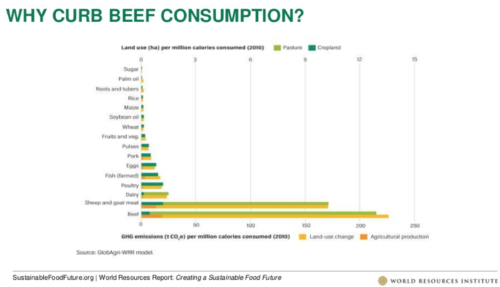Click through for an update on meals at Princeton Public Schools with the appointment of K. Lee Dixon. From her LinkedIn page: She has been operations manager since Aug 2008 at NutriServe Food Management, the current food service purveyor for Princeton Public Schools. Her previous position was sales and catering manager for Aramark Refreshment Services at the Franklin Institute, June 2005-2007. She graduated from the Richard Stockton College of New Jersey in 1994.
karlacook
Diet and our carbon footprint
 #nowweknow From the piece: Beef, goat and sheep production requires more than 20 times more land and generates more than 20 times more greenhouse gas emissions than pulses, a plant that is in the legume family — dry beans, dry peas, chickpeas, lentils — per gram of protein, according to the report….Beef alone is responsible for 41% of livestock greenhouse gas emissions, and that livestock accounts for 14.5% of total global emissions, according to the UN. That’s more than direct emissions from the transportation sector. In the US, beef only accounts for about 3% of the calories in the average US diet, but it uses 43% of US land used for agriculture, according to the report.
#nowweknow From the piece: Beef, goat and sheep production requires more than 20 times more land and generates more than 20 times more greenhouse gas emissions than pulses, a plant that is in the legume family — dry beans, dry peas, chickpeas, lentils — per gram of protein, according to the report….Beef alone is responsible for 41% of livestock greenhouse gas emissions, and that livestock accounts for 14.5% of total global emissions, according to the UN. That’s more than direct emissions from the transportation sector. In the US, beef only accounts for about 3% of the calories in the average US diet, but it uses 43% of US land used for agriculture, according to the report.
https://www.cnn.com/2019/07/17/health/beef-environment-resources-report/
Breakfast for the champions
#nowweknow that PPS, under the direction of Chef Coby Farrow of NutriServe, is rolling out a new plants-rich framework for school meals, we are excited about power foods at breakfast as well as lunch!
From the piece: Students who start the day with breakfast do better on standardized tests, have fewer behavioral problems in the classroom and miss fewer days of school. When students skip breakfast, even if they are otherwise well-fed, they are more likely to make errors and have trouble recalling details. For students who live in food insecure households, the negative effects of missing breakfast are more pronounced. Over time, undernourished students will see lower grades and standardized test scores and are less likely to succeed in school. The cognitive effects of food insecurity also can translate into disciplinary incidents and mental health issues.
Here’s the link.
